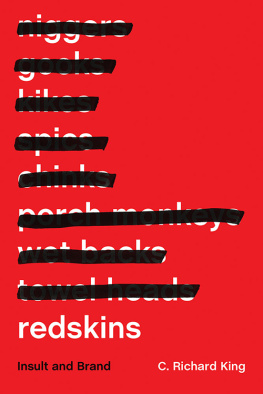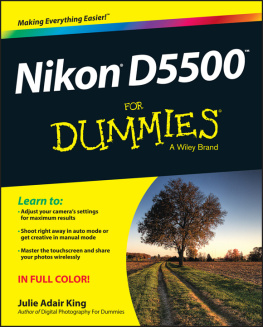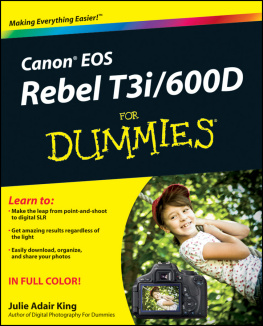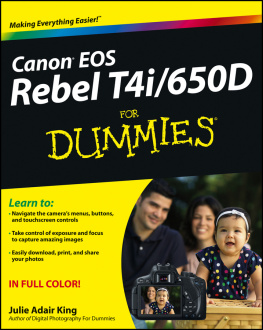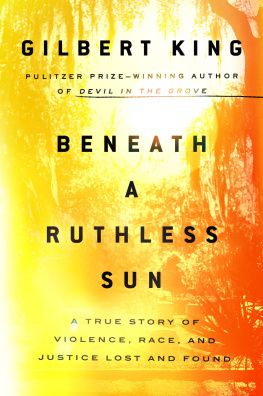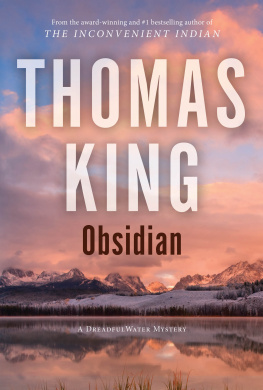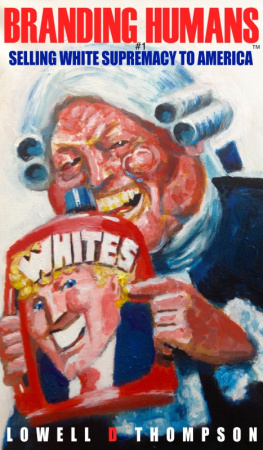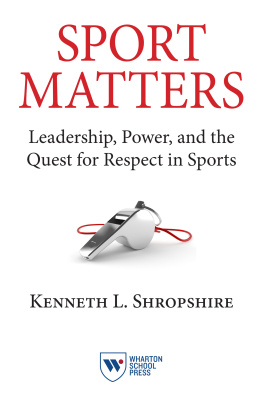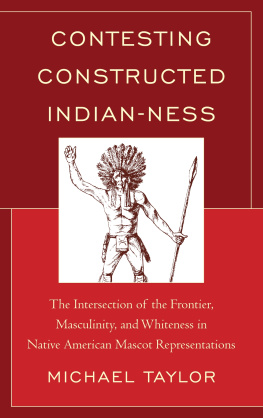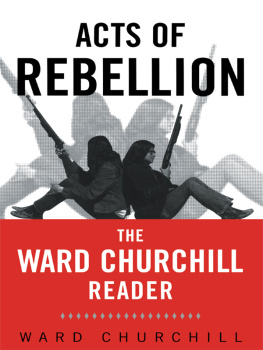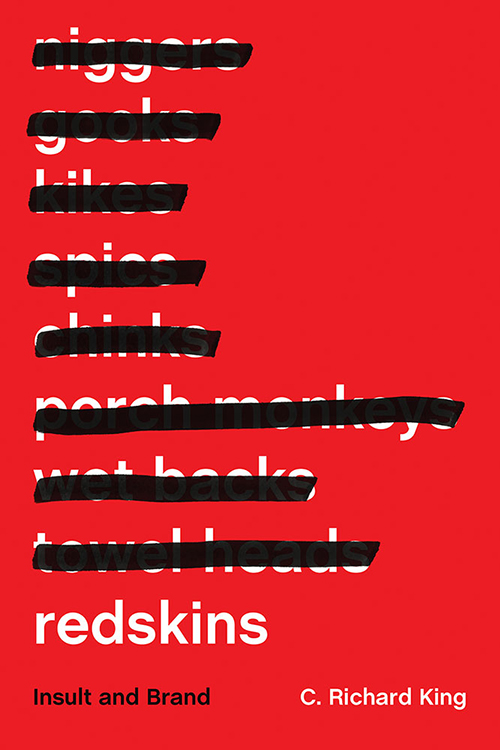
If you oppose the use of a racist slur as the name of the NFL franchise that represents the nations capital, this is the book for which youve been waiting. If you dont, this is the book you need to read.
Lawrence R. Baca (Pawnee), former national president of the National Native American Bar Association
This book is a must-read for academicians, policy makers, lawyers, and sports fans. King takes us to the root of American insensibilities, racist attitudes, and the invention of connotations, and in the end he offers hope and ways to recognize humanity.
Manley A. Begay Jr. (Navajo), professor in the Department of Applied Indigenous Studies at Northern Arizona University
King provides an insightful and engaging story of the meaning and power of a single word that has influenced peoples lives for nearly three centuries.
Jay Coakley, author of Sports in Society: Issues and Controversies
Moving and compelling, author Richard Kings carefully crafted words resonate with a deep humanity.... Sports executives, sports marketers, journalists, public policy makers, educators, and citizens need to read this book.
Ellen J. Staurowsky, professor of sport management at Drexel University
Kings book is a must-read for those who seek to understand the experience of contemporary activists as they challenge the use of Native American logos, epithets, and imagery as sports mascots.
Jennifer Guiliano, author of Indian Spectacle: College Mascots and the Anxiety of Modern America
If youre still sitting on the fence, Kings impressive research and expert delineation of the controversy will convince you its time to rethink the name and change it now.
Linda M. Waggoner, historian and author of Fire Light: The Life of Angel De Cora, Winnebago Artist
Redskins
Redskins
Insult and Brand
C. Richard King
University of Nebraska Press | Lincoln and London
2016 by the Board of Regents of the University of Nebraska
Cover image adapted from Gregg Deal / greggdeal.com
Author photo courtesy Marcie L. Gilliland
All rights reserved
Library of Congress Cataloging-in-Publication Data
Names: King, C. Richard, 1968 author.
Title: Redskins: Insult and brand / C. Richard King.
Description: Lincoln: University of Nebraska Press, [2016] | Includes bibliographical references and index.
Identifiers: LCCN 2015031826
ISBN 9780803278646 (cloth: alk. paper)
ISBN 9780803288430 (epub)
ISBN 9780803288447 (mobi)
ISBN 9780803288454 (pdf).
Subjects: LCSH : Washington Redskins (Football team). | Branding (Marketing). | Racism in language. | English languageUnited StatesSlang. | English languageUnited StatesSlangSocial aspects. | Stereotypes (Social psychology)United States. | InvectiveUnited States. | Indians of North AmericaEthnic identity. | Indians of North AmericaSocial conditions.
Classification: LCC GV 953. W 3 K 56 2016 | DDC 796.332/6409753dc23 LC record available at http://lccn.loc.gov/2015031826.
The publisher does not have any control over and does not assume any responsibility for author or third-party websites or their content.
For the haters, the warriors, and the future
Contents
This project took shape over many years and owes much to many people. While it took shape in the wake of the resurgent controversy surrounding the Washington professional football team, it builds on many established collaborations and ongoing conversations. I have benefited over the years leading up to this book from the guidance, council, and inspiration of many leaders and scholars, including Amanda Blackhorse, Laurel Davis, Stephanie Fryberg, Michael Giardina, Jennifer Guiliano, Jennifer Harvey and Carol Gunderson, Suzan Shown Harjo, Tara Houska, Jacqueline Keeler, Adrienne Keene, Cornell Pewewardy, David Prochaska, Rob Schmidt, Carol Spindel, Ellen Staurowsky, Pauline Turner Strong, Charlene Teeters, Linda Waggoner, and especially Chuck Springwood. Of equal importance, this work derives from the blood, sweat, and tears that countless advocates, activists, artists, and educators within and beyond Indian Country have invested in the pursuit of justice, civil rights, and dignity. To them I owe my deepest debt of gratitude, both for what they have taught me and for how they endeavored to make the world a better place.
Throughout the publication process, I have had the good fortune of working with the staff of the University of Nebraska Press. Their support and expertise have proven invaluable to me. Of particular note have been the efforts of Heather Stauffer and my editor, Matthew Bokovoy.
I am grateful as well to the artists and photographers who have provided illustrations for this book and routinely deepened my thinking about indigenous issues, social justice, and the human condition. I appreciate Marty Two Bulls, Doug Nemanic, and Fibonacci Blue agreeing to include their work. A special thanks to Gregg Deal for his many creative interventions, especially the art featured on the cover.
Over the years, the Colleges of Arts and Sciences at Washington State University have provided regular and meaningful support of my research, for which I am particularly grateful. Of special note, my colleagues in Critical Culture, Gender, and Race Studies at Washington State University deserve much credit for creating an intellectual community that nurtures good work. I appreciate especially the contributions of David J. Leonard, Carmen Lugo-Lugo, Mary Bloodsworth-Lugo, and Lisa Guerrero. I have benefited, moreover, from the hard work of Debbie Brudie, Cerissa Harper, and Rose Smetana. My students have routinely allowed me to engage with aspects of this project, often pushing to refine my thinking and argumentation.
I presented portions of this work previously at the National Museum of the American Indian, as part of its symposium Racist Stereotypes and Cultural Appropriation in American Sports, and at lectures at the University of Graz, University of Maribor, University of Passau, and University of Regensburg. I am especially grateful to Karsten Fitz and Nassim Balestrini for their support during these visits. A presentation at the White Privilege Conference, at the invitation of Abby Ferber, and interest from Chuck Modiano, who maintains popsspots.com, also proved instrumental to my early thinking on this project.
Last, but certainly not least, I must again acknowledge the love and support of my family. My daughters, Abbey and Ellory, continue to inspire with how they think about the world and amaze me with how they try make it a better place. And I really cannot say enough to thank my life partner and best friend, Marcie, for all she has done for me. She has given me more than she knows and made me capable of more than I ever imagined over the years. She is a rare jewel I cherish more each day.
Names and naming, as this book details, always carry a charge in the study of indigenous people, precisely because they articulate power, identity, and representation so succinctly, forcefully, and often invisibly. Thus, one must take great care in the interpretation and application of language. Colonial histories, national narratives, and cultural practices do not make this easy. In what follows, I make two conscious language choices. First, I will use American Indians, Native Americans, indigenous peoples, and native nations interchangeably in this text. Second, I endeavor to avoid the r-word. I understand it to be a racial slur, on par with the n-word. While the former enjoys wider acceptance and use than the latter, this is not a defensible rationale for relying on it. In fact, persistent reiteration makes it appear reasonable and even appropriate, a pattern that I think important to disrupt and undermine. To this end, I will substitute phrases like

